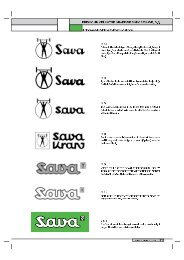Annual report 2005 - Sava dd
Annual report 2005 - Sava dd
Annual report 2005 - Sava dd
You also want an ePaper? Increase the reach of your titles
YUMPU automatically turns print PDFs into web optimized ePapers that Google loves.
a n n u a l r e p o r t | 2 0 0 5<br />
1 9 8 |<br />
a competent decision that reasonable grounds exist;<br />
• an 80 per cent adjustment in receivables filed in an<br />
obligatory enforcement proceeding.<br />
Cash<br />
Cash consists of book money. Book money is money on<br />
accounts at a bank or any other financial institution and<br />
can be applied for payment. It consists of immediately<br />
available cash. The book value of cash equals its initial<br />
nominal value until the need for a revaluation appears.<br />
Cash in foreign currency is translated to a domestic<br />
currency at the exchange rate on the day of receipt.<br />
The revaluation adjustment of cash in foreign currency<br />
is carried out on the day of <strong>report</strong>ing. It appears only in<br />
case of cash expressed in a foreign currency. On<br />
conversion the mi<strong>dd</strong>le exchange rate of the Bank of<br />
Slovenia is used. The revaluation adjustment of cash is<br />
shown as financial revenue and expenses, respectively.<br />
Capital<br />
The total capital comprises called-up capital, capital<br />
reserves, revenue reserves, retained net profit or loss<br />
from previous periods, equity revaluation adjustments<br />
and temporary also undistributed net profit.<br />
Share capital is managed in the domestic currency.<br />
Long-term provisions<br />
Long-term provisions are formed from long-term<br />
accrued costs or expenses and are earmarked for<br />
covering contingent liabilities arising from lawsuits.<br />
Liabilities<br />
Liabilities are either financial or operating, short-term or<br />
long-term.<br />
All liabilities are initially recognised with the amounts<br />
arising from the corresponding documents about their<br />
appearance, which prove the receipt of cash or redemption<br />
of any operating liability, in the case of long-term<br />
operating liabilities the receipt of tangible fixed assets, in<br />
the case of short-term operating liabilities the receipt of a<br />
product or a service or performed work and charged costs,<br />
expenses or a share in the net profit respectively.<br />
Long-term liabilities are further increased by imputed<br />
interests or decreased by repaid amounts and any other<br />
settlements, agreed upon with a creditor. The book value<br />
of long-term liabilities equals their original value<br />
decreased by repayment of the principal and transfers<br />
under short-term liabilities until the need for a<br />
revaluation adjustment of long-term debts appears.<br />
The book value of short-term liabilities equals their<br />
original value adjusted by their increases or decreases as<br />
agreed upon with the creditors until the need for their<br />
revaluation adjustment appears.<br />
Short-term and long-term liabilities of all kinds are<br />
initially shown with the amounts, which arise from the<br />
corresponding documents on condition that the creditors<br />
request their repayment. The liabilities are later<br />
increased with imputed yields (interests, other<br />
compensations), about which an agreement is made with<br />
the creditor. Liabilities are decreased by repaid amounts<br />
and any other settlements in agreement with the<br />
creditor. Long-term liabilities are decreased for the part<br />
that should be paid in less than a year, which is shown<br />
under short-term liabilities.<br />
Short-term accruals and deferrals<br />
Deferred costs and accrued revenues include short-term<br />
deferred costs.<br />
Short-term accrued costs and deferred revenues include<br />
deferred input tax on a<strong>dd</strong>ed value due from effected<br />
advances.<br />
The basis for short-term accruals and deferrals are the<br />
facts determined owing to certain knowledge and put<br />
down as a resolution about the formation of short-term<br />
accruals and deferrals and book-keeping documents<br />
acquired from the external business partners.<br />
Recognition of revenues<br />
Revenues are recognised if the enhancement of<br />
economic benefits in the accounting period is connected<br />
with an increase in an asset or decrease in a liability and<br />
such an increase could be reliably measured.<br />
Revenues are recognised when it is legitimate to expect<br />
they will result in earnings if these were not already<br />
implemented at their appearance.








